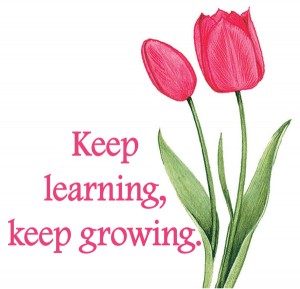By Rose O. Sherman, EdD, RN, FAAN
 Many years ago, I was teaching a Nuts and Bolts Leadership course at a large medical center where I worked as the Chief of Employee Education. The course was designed for beginning leaders from all departments in the hospital. One day I received a call from a highly regarded senior leader in the organization asking me if he could attend. I told him that of course he could but he might be familiar with much of the content. He came faithfully to all five sessions of this 40 hour course. At the end of the course, he told me that he had learned a great deal and added “This will make me a better leader. I never want to stop learning.” He wisely realized that leadership is a journey not a destination and there is always more to be learned.
Many years ago, I was teaching a Nuts and Bolts Leadership course at a large medical center where I worked as the Chief of Employee Education. The course was designed for beginning leaders from all departments in the hospital. One day I received a call from a highly regarded senior leader in the organization asking me if he could attend. I told him that of course he could but he might be familiar with much of the content. He came faithfully to all five sessions of this 40 hour course. At the end of the course, he told me that he had learned a great deal and added “This will make me a better leader. I never want to stop learning.” He wisely realized that leadership is a journey not a destination and there is always more to be learned.
At an earlier point in history, it was believed that people were born with their leadership traits and skills. While there are natural leaders, most of us evolve as leaders over time. Today, there is strong evidence that the best leaders are the best learners. As an outcome of their research with leaders globally, Kouzes and Posner in their book The Truth about Leadership identify ten truths about leadership. One of those truths is that leadership is a pattern of practices, behaviors, skills and abilities that can be learned. Developing expertise in leadership takes practice. There is no fast track to leadership. Malcolm Gladwell in his book Outlier: The Story of Success observed that becoming an expert in anything takes about 10,000 hours of practice across 10 years. That amounts to about 2.7 hours each day.
The challenge to continue to grow and learn as a leader is one that each person must accept for themselves. Personal development is just that—personal. What works for one person may not work for you. Here are 10 suggestions for activities to use to keep learning as a leader:
- Buy and read at least a leadership book twice a year – outside of healthcare.
- Attend leadership development opportunities offered by your employer, even if it means going on your own time.
- Subscribe to free leadership blogs and podcasts – I especially like the Read to Lead podcast with Jeff Brown and the Smart Brief on Leadership Blogs.
- Observe closely the leadership skills of others whether in your work setting, the political arena or your church. Think about whether you are observing leadership behavior that you would want to emulate or not.
- Ask questions in every aspect of your life such as: Why is this happening this way? What could be done differently? What role did leadership or lack of leadership play in this situation?
- Leave your office and engage in new and different interactions with someone you would not ordinarily speak with as potentially providing a leadership learning experience.
- Carefully reflect on mistakes that you make and take actions to ensure the mistakes don’t happen again.
- Establish a few goals for leadership self-development each year and look for activities to achieve those goals.
- Be the first to volunteer to attend classes or serve as champions on new technology or changes in practice.
- Join a professional organization that provides leadership development opportunities through conferences, webinars or committee participation.
Nurse leaders are role models. We want the nurses that we lead to be learning, developing and growing. It is hard to convince them to do so if they don’t see you doing it. On the flip side, there is nothing more powerful than when staff see their leader back in school furthering their education. If you want to develop a learning environment, you must be out first.
Read to Lead
Gladwell, M. (2011). Outliers: The Secret to Success. Back Bay Books.
Kouzes, J.M. & Posner, B.Z. (2010). The Truth about Leadership. Jossey-Bass.
© emergingrnleader.com 2017


 LinkedIn
LinkedIn Instagram
Instagram